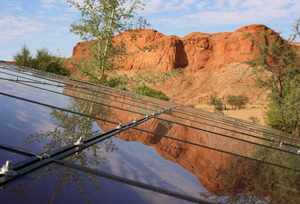
Solar makes sense for Desert Lodge

A greener footprint in an ecologically sensitive area around the Namib Desert Lodge. An array of solar panels in the shadow of the fossilized dunes relieves the lodge’s demand on mains electricity.
The main building and chalets of Namib Desert Lodge are nestled against the fossilised dunes of the primeval Namib. The 65 en-suite rooms are equipped with air-conditioning to ensure a pleasant stay. Despite all its mod cons, Namib Desert Lodge now relies on solar power for a part of its daily energy.
In February this year a total of 1700 solar panels were installed on the roofs of the guest chalets and other buildings. The target is to generate 200,000 kWh of electricity per year and cover 50% of the lodge’s energy needs.
This is a pilot project in the Namibian tourism industry. In the Namib hardly a day goes by without sunshine, but a solar power plant of this size has never before been taken into operation under extreme desert conditions. If the one-year trial run proves successful the solar project will be repeated at the group’s lodges in Gondwana Canyon Park.
Namib Desert Lodge, Canyon Roadhouse, Canyon Village and Canyon Lodge received the highest seal of quality – five desert flowers – from the environmental initiative Eco Awards Namibia last year.
The lodges scored important points with their water recycling plants which provide irrigation for the gardens and thereby reduce overall water consumption by more than half. The gardens have largely been planted with indigenous trees, shrubs and succulents that do not use large amounts of water. The lodges’ waste disposal also earned them points: waste is sorted, glass is crushed and tins are pressed. Everything is then taken to recycling collection points. The experts and jury of the Eco Awards were also impressed by the staff training programmes which include courses on environmental awareness.













































